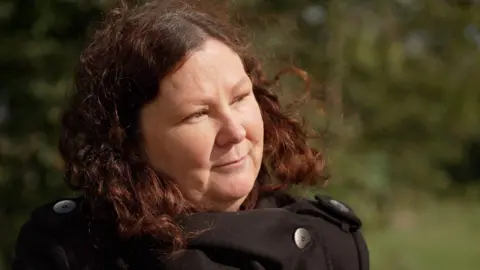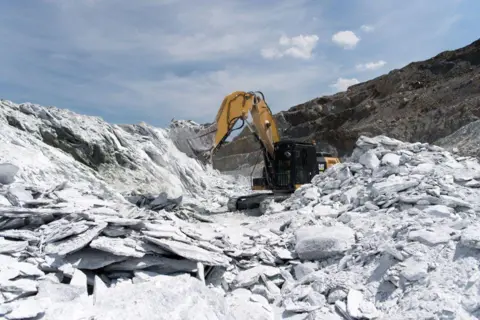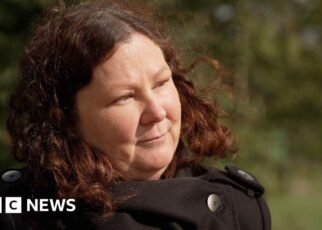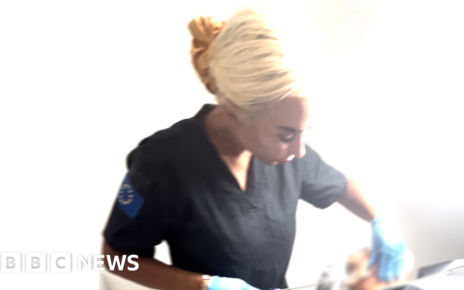[ad_1]
 BBC
BBC Hundreds of women in the UK are planning to take on one of the world’s biggest pharmaceutical companies over alleged links between talc and cancer.
Diagnosed with ovarian cancer in 2021, Cassandra Wardle is one of the women launching a group action against the biggest seller of talcum powder, Johnson & Johnson (J&J).
Cassandra, who stumbled on a Facebook article linking cancer and talc following her diagnosis, said it was used on her as a baby and she continued to use it “for 20 years or more”.
“You mimic your mum who used it,” she said. “Baby powder was supposed to be something deemed ‘safe to use’, even on a baby’s bum.”
If it proceeds, the legal action would be the first of its kind brought against the pharmaceutical multinational in the UK.
With 1,900 potential claimants, including cancer patients, survivors and families, lawyers say it is set to be the largest pharmaceutical product group action in English and Welsh legal history.
The BBC has spoken to a number of women with gynaecological cancers – many are part of the group action – who believe their repeated use of talcum powder played a part in their diagnosis.
Their lawyers allege that for decades, talcum powder was contaminated with cancer-causing asbestos – something they claim J&J was aware of but sought to suppress.
J&J denies suppressing any information and denies any links between its baby powder, asbestos and cancer.
 Cassandra Wardle
Cassandra Wardle“The doctors said the cancer was unusual for my age at 44,” says Cassandra, from Alfreton in Derbyshire.
She says she would regularly use talcum powder after a bath or as a deodoriser, including across her genitals.
“I was just starting my chemo journey when I read about the links, but I felt enraged that a corporate giant like J&J could seem to do this,” she says.
At first, doctors believed Cassandra’s cancer was terminal.
“I went to the consultation alone,” she says. “So I had to come home and tell my husband what they said, tell my parents they would be burying me.
“I closed down my business unit and laid off staff.
“I even created a not-so-creative acronym: ‘LAC – Life After Cass’.”
 Cassandra Wardle
Cassandra WardleThen, she had an unexpected lifeline. Chemotherapy had in fact triggered an autoimmune condition, giving the impression of late-stage cancer.
Cassandra survived. But the disease still had a devastating effect on her life.
She was forced to give up her business, and an infection during chemotherapy damaged her vocal cords, reducing her voice to a whisper. A hysterectomy to remove cancerous tissue had a huge impact on her body.
“I was plunged into surgical menopause,” she says.
“I would have liked children. I was never blessed that way, but my last ability to have children was taken away due to cancer.”

Are there links between talcum powder and cancer?
 Getty Images
Getty ImagesThe claims of links between talcum powder and cancer revolve around asbestos – a known carcinogen.
Talc is a mineral that is sometimes used in talcum powders and other cosmetic products, according to Cancer Research UK.
Sophia Lowes, from the charity, said: “[Talc] can be mined in places where there is asbestos, which can cause the talc to become contaminated. Asbestos is known to cause mesothelioma and cancers of the lung, larynx and ovary.
“The sale of products containing asbestos is banned in the UK and cosmetic products need to be safety-tested before they can be sold.”
Many documents were hidden from public view until Americans with cancer began suing the firm.
J&J has been accused of knowing decades ago that its baby powder could contain contaminants of asbestos.
J&J has previously said that “any suggestion that Johnson & Johnson knew or hid information about the safety of talc is false”.
The company discontinued mineral-based talc in North America in 2020 – and followed suit in the UK last year – replacing it with cornstarch. J&J said this was due to financial pressures and a “misinformation campaign” around the product.
While the focus of the group action is on the contamination of talc with asbestos, in July this year the World Health Organization (WHO) concluded that mineral talc itself was “probably carcinogenic for humans”.

 Getty Images
Getty ImagesDeborah, who did not want to be identified by her real name, also lives in Derbyshire, and was diagnosed with ovarian cancer at 29, just two weeks after she and her husband had started trying for a baby.
“I used talcum powder for years as a teenager,” she says.
“Literally all I had was some stabbing pain on a Sunday night. I went to the doctor and was sent for an ultrasound on the Tuesday.”
During the scan, a tumour was found on Deborah’s ovary. A few days later she had an operation, at which point doctors told her there was a risk the cancer had spread to her womb.
“Within two weeks of the first symptoms, I’d had a full hysterectomy,” she says.
“I went from excitedly planning for a baby to having all of my parts removed.”
Deborah’s diagnosis was 30 years ago, and she and her husband ultimately went on to adopt.
But she still feels angry that she was robbed of the chance to conceive naturally.
“If [J&J] knew, they shouldn’t have been doing it,” she says.
 Getty Images
Getty ImagesKP Law, representing the claimants, has begun the process of litigation, which is expected to start at the beginning of 2025.
In the US, the firm has been sued by more than 62,000 people and at least $13bn has been paid out or set aside in response to the action.
Cases there have seen the company found liable for mesothelioma – an asbestos-specific cancer – and gynaecological cancers women suffered after using talc, with billions of dollars awarded in damages.

Tom Longstaff, a partner at KP Law, says: “The case has been litigated repeatedly in the American judicial system but women in the UK deserve an answer, and compensation, here.
“Asbestos cancers tend to have a latency of around 10 to 40 years. So we are walking into a wave of women reaching an age where asbestos cancers develop.”
Mr Longstaff’s firm sent a pre-action letter to J&J in September, a necessary step before starting proceedings. If the case goes ahead, it would likely end up in court next year.
In response, Erik Haas – worldwide vice-president of litigation for Johnson & Johnson, said the allegations against the company “defy logic, rewrite history and ignore the facts”.
“J&J takes the issue of talc safety incredibly seriously and always has,” he says.
“As our documents show, we have relied upon the most state-of-the-art testing protocols for decades and have been entirely transparent with government institutions and academic researchers regarding our findings.”
Mr Haas also said the idea that J&J hid the contaminated contents of its products from the public, government and other groups was “inconceivable and false”.
 Linda Jones
Linda JonesLitigation like this can take four or five years. Some of the women we spoke to fear they won’t see it concluded.
Linda Jones has stage four cancer, which has reached her bones and blood.
“I don’t have that long left. I might be dead by the time it’s sorted out,” the 66-year-old, from Devon, says.
“I loved [talcum powder]. After a bath at night, it was a great big warm hug putting on Johnson’s baby powder.
“As soon as my children were born, I used it on them.”
If she does get a settlement, she wants to help other women going through similar situations. She hopes to set up a holiday retreat for women diagnosed with gynaecological cancers.
“I just want to see them compensating everyone without a fight. We already had a fight in the States,” she says.
A J&J spokesperson said: “As the history of the US talc litigation shows, the majority of cases tried resulted in defence verdicts or were overturned in favour of the defence on appeal.
“The UK judicial system is vastly different than in the US, and we believe that if a UK court has an opportunity to review the scientific literature and company documents in proper context, it too will conclude that Johnson’s baby powder is safe, does not contain asbestos, and does not cause cancer.”
[ad_2]
Source link




